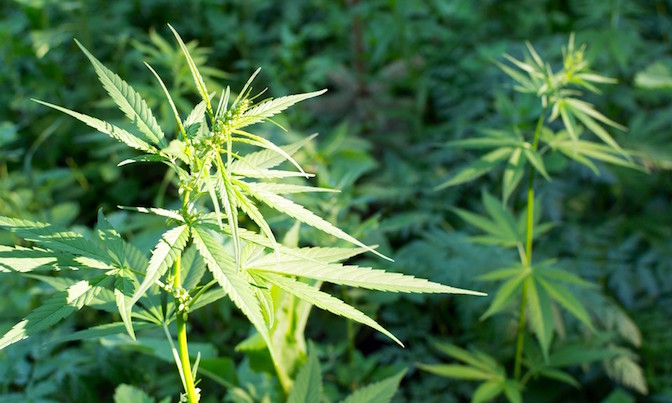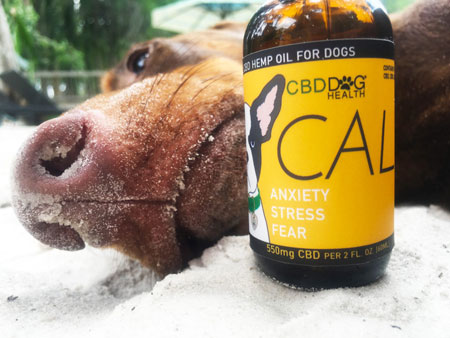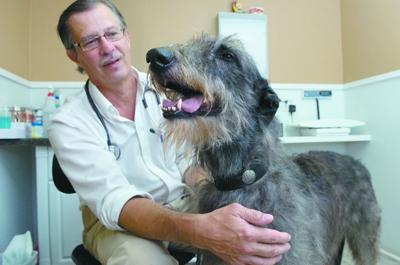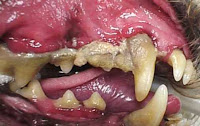CBD's And Our Pets
 CBD's (Cannabidiol) are derived from the hemp plant and there's anecdotal evidence that it may help pets suffering from many problems including, and certainly not limited to, anxiety, allergies, seizures, hot spots and so much more. The landscape is confusing though. Many retailers are hopping on the bandwagon. While there are honest merchants, there are also many that rely on the lack of certification to sell their CBD products. Dr. Robert Dove and Medical Cannabis Expert Angela Ardolino will help you parse through the misinformation and select a product that can help your pet live a healthier and happier life.
CBD's (Cannabidiol) are derived from the hemp plant and there's anecdotal evidence that it may help pets suffering from many problems including, and certainly not limited to, anxiety, allergies, seizures, hot spots and so much more. The landscape is confusing though. Many retailers are hopping on the bandwagon. While there are honest merchants, there are also many that rely on the lack of certification to sell their CBD products. Dr. Robert Dove and Medical Cannabis Expert Angela Ardolino will help you parse through the misinformation and select a product that can help your pet live a healthier and happier life.
Angela Ardolino, CBD Dog Health
 Angela Ardolino is an entrepreneur and has been taking care of and rescuing animals most of her life. She rescues dogs and farm animals and says she is the one that ends up with the senior dogs and the dogs with the problems, as well as the roosters and the mini pigs that aren't really mini pigs after all. She is also a medical cannabis expert and formed CBD Dog Health after discovering the life-changing benefits of CBD in treating her own arthritis and anxiety.
Angela Ardolino is an entrepreneur and has been taking care of and rescuing animals most of her life. She rescues dogs and farm animals and says she is the one that ends up with the senior dogs and the dogs with the problems, as well as the roosters and the mini pigs that aren't really mini pigs after all. She is also a medical cannabis expert and formed CBD Dog Health after discovering the life-changing benefits of CBD in treating her own arthritis and anxiety.
The difference between hemp CBD and Marijuana, according to Angela, is that while they are both from the cannabis plant, marijuana has THC in it and that's what gets you high or gives you the psychoactive feeling. Hemp does not have THC in it or has very little THC in it. THC is just like another compound like CBD is. However, hemp is also a lot higher in CBD than marijuana is. Hemp CBD is what is legal in all 50 states, while marijuana CBD is not.
Angela explains that CBD is a compound in the cannabis plant and it interacts with our endocannabinoid system. Our endocannabinoid system controls everything from our mood, stress and anxiety to appetite. It also controls things like inflammation. Basically, CBD and hemp medicine brings the body back into a homeostasis point. Some people and some pets have an endocannabinoid deficiency and CBD is in the cannabis plant, but it's also in a couple other plants. When you ingest it, it actually feeds your endocannabinoid system and brings you to a nice, normal state.
So if you have a dog that is scared to death of thunderstorms, or fireworks, or going to the groomer or vet or just even any type of loud noises, giving them a full spectrum CBD oil right under their lip that they can absorb through their gums and get right into their bloodstream, will actually calm them down. This will happen to some dogs immediately and others within 20 minutes.
If you have a senior dog who has arthritis or hip problems, just by giving them a higher dose of CBD, will encourage them to start running around and acting a puppy because the pain and the inflammation will have been reduced tremendously.
Angela says it is impossible to give your pet too much CBD and that they can't overdose on it. It doesn't affect the same system that opioids or prescription medications do. It doesn't affect their breathing or heart rate, so they cannot overdose on it. You could actually pour an entire bottle of CBD Dog Health's 1100 milligram tincture down a dog's throat, and if anything, he will probably sleep really well and maybe have a little bit of diarrhea.
CBD Dog Health makes a full spectrum CBD. So what exactly does that mean? Angels explains that full spectrum means that when they extract the oil, and they extract from the hemp flower only and don't extract from the leaves or stocks or any other part of the plant, they do it in a process that keeps all the plant's compounds intact. When all the compounds are intact, that's when you get the best medicine. So you want to make sure whatever you use is full spectrum. This also includes a little bit of THC at 0.3-percent. If it's broad spectrum, that means it has several of the cannabinoids intact but doesn't have any of the THC in it. That's the biggest difference and that's what you want.
There is a lot of confusion in the marketplace because it's not regulated yet. So people are making all kinds of claims and putting products out. However, those that are doing right in the industry, like CBD Dog Health, are doing third party laboratory testing.
CBD Dog Health gets every single batch tested by a third party and they put those results right on their website. When you go to their website and look at one of the products, you'll see the pictures where the third party lab certificate is. What that lab certificate shows you is that there are other cannabinoids intact and in the tincture. You can see it a little bit of THC in there, so when the other cannabinoids are there, you're seeing that it's a full spectrum and you're seeing how much of it is actually in the tincture or in a serving.
 When looking for a CBD, you want to look for those certificates and make sure that they're recent and that they are full panel, meaning they're testing everything. This also means they are testing whether there's herbicides in it, any chemical fertilizers, both types of toxins that we don't want for our pet, especially if they're sick. The certificate will show all of these things so you can be sure you're getting a pure product.
When looking for a CBD, you want to look for those certificates and make sure that they're recent and that they are full panel, meaning they're testing everything. This also means they are testing whether there's herbicides in it, any chemical fertilizers, both types of toxins that we don't want for our pet, especially if they're sick. The certificate will show all of these things so you can be sure you're getting a pure product.
If you're buying a bottle of CBD for $19.95 or $29.95, it probably doesn't have any CBD in it. And if you're buying it on Amazon, it's probably not a real product. You want to go with the brands and unfortunately right now it's kind of confusing buying it online. You actually need to find the good brands by doing your research, going to their website and seeing who the founder is. You also want to see their certificates. Other things to remember when purchasing CBD's, is that if it looks too good to be true, then it's probably not the real thing.
CBD Dog Health's tinctures are a little expensive. But you have to compare apples to apples. While the other companies out there are making the same type of products, CBD Dog Health's products are a little different because they add natural essential oils in their tinctures to also help with the ailment.
For example, a bottle that works on anxiety, stress and fear also has lavender essential oil in it. Their 'Ease' has turmeric oil and frankincense oil, which are also amazing anti-inflammatories for arthritis and allergies. Their 'Heal,' which is their most potent, has 1100 milligrams of full spectrum CBD in it and hemp seed oil, which is also an amazing fatty acid and omega-3 and omega-6 and then an MCT oil to help with absorption of the medicine. So they add other essential oils into their tinctures, which makes them a little different.
You just want to make sure there's enough CBD in it. She says it should contain no less than 500 milligrams or 9 to 10 milligrams per serving of full spectrum CBD if you really want to see the medicine work.
Angela has a degree in medical cannabis from the University of Vermont School of Madison, who launched their first class in medical cannabis in 2016, which she attended. She tells us she actually found the medicine because she wanted to treat her own rheumatoid arthritis naturally. It worked so well; she sold her business and threw herself into the medical cannabis industry. Then when she learned that animals have the same system, she thought it was perfect. However, she couldn't find a product for pets and wondered why no one was making one. She then developed her own. She comes from a background of working with animals her entire life and didn't decide to jump right in and join the gold rush to try to make money; this is something that she's very passionate about. To Angela, it's an all-natural medicine that has been kept from both people and our pets.
CBD's do so many great things and there are no bad side effects. We're finally seeing it legalized and now it's just a matter of educating the public on how to choose the right product. This also includes educating the general public, as well lawmakers and departments of agriculture, on how hemp and marijuana are different. Angela still gets told the wrong information by people who should know better all the time, which is so frustrating, but it's a brand new industry.
So how do the companies that make CBD's differentiate them for pets from those for humans? Angela explains that pets or animals have 10 times more receptors than humans do. So they're much more sensitive to the medicine, which is why you don't want to have very much THC in it. So you're going to see difference between dosages of what a human needs and what a pet needs. The other thing is that a lot of human companies add different things or flavorings in it that are not good for pets. When Angeles started this journey two years ago, the first product that she got was from a human company who then made a pet product and all they did was change the label. They didn't change the tincture at all and it had stevia in it, which makes dog sick.
When Angela first stared in the business, she thought she was going to have to grow her own hemp, because she couldn't find anyone with a pure product and without pesticides and herbicides. However, it's changed so much in the last two years.
Be aware that there are a lot of human companies who see a market where they can make more money, so they will take the human product and just put a different label on it and sell it as a pet product. The problem with that is that there are ingredients in it that a pet shouldn't have. Also, the milligrams are usually too high for a pet. That's when you'll start seeing a pet acting high or showing signs of being affected by the psychoactive components because it has too much THC in it.
Angela feels everyone should know about CBD's and that they are a great natural medicine.
Visit Website
Dr. Robert Dove, Companion Animal Clinic
 Dr. Robert Dove, from the Companion Animal Clinic of Gainesville, Virginia, educates us about CBD's. We have all heard how CBD's are the new 'cure all' and can treat our pets for everything from anxiety to inflammation and even cancer. Dr. Dove is no exception and has heard all of this as well.
Dr. Robert Dove, from the Companion Animal Clinic of Gainesville, Virginia, educates us about CBD's. We have all heard how CBD's are the new 'cure all' and can treat our pets for everything from anxiety to inflammation and even cancer. Dr. Dove is no exception and has heard all of this as well.
However, Dr. Dove states that there are probably some conditions that it'd be more indicated than others, but he says all of those things are helped by CBD's including nerve support movement, coordination, support, immune system, cell lifecycle, reproduction circulatory and bone development. There are even some holistic practitioners that are using it for cancer aid as well.
There is some science behind it even though it's very, very new. There is good evidence in dogs and some evidence in cats, but that's still pretty new. Dr. Dove has even seen some evidence in birds and horses. There are a fair number of people in his area that are in the equine industry and they certainly use it.
As a consumer, you need to know where to purchase it and what to buy, according to Dr. Dove, and there is a lot of confusing information out there.
Are CBD's marijuana or a derivative of marijuana? Dr. Dove explains that unfortunately, hemp got in the same classification as marijuana. They are both cannabis, but hemp is not marijuana. Hemp is defined as cannabis and if it has less than 0.3-percent THC, the psychoactive ingredient, then it's classified as hemp. It's a totally different plant from marijuana, but unfortunately back in the 30s, it got lumped in there with marijuana when marijuana was a classified as a dangerous substance. Hemp has remained there pretty much ever since.
Most people are using CBD's on their pets for anxiety and mild discomfort categories. That's probably the number one reason for using them. Other reasons to use CBD's are for epilepsy, restlessness and neurodegenerative diseases. However, there are other things as well. For instance, concurrent use of hemp oil might help to reduce the amount of pain relievers you give your pet. For example, if your pet is on pain relievers for osteoarthritis, the use of full spectrum hemp oil might allow you to decrease the dosages of the drugs. This is a good thing, because there are some side effects with some non-steroidal anti-inflammatories and the use of hemp oil would be beneficial there. Other things treated by CBD's are fear, anxiety and aggression. Also think about those types of things like thunderstorms, car rides, a nail trimming, grooming, and going to the vet's. Perhaps a dose of hemp oil before you leave the house before doing these things might be a good thing. You don't need to worry about CBD's, as your cat or dog won't be getting high on them.
CBD's are available in both oils and pills and Dr. Dove recommends using the oils. This is because they're absorbed a little bit easier into the body than powders, pills or granules. For the oils, you can use a small dropper based on the volume that's required for your sized pet. You then just squirt it underneath their tongue or between their cheek and gum. A lot of it is absorbed through the mucus membrane and then the rest is swallowed. As it's being swallowed, because it's a small amount, it will be absorbed through the esophageal tissues. So you probably get a better level of the full spectrum CBD's than if you had just used a powder and mixed it into their food.
You want to make sure you use full spectrum hemp, which includes all the natural phytochemicals that are present in hemp oil. Dr. Dove thinks there are roughly 480 of them. He believes around 120 of them have been specifically identified and named. It will also include terpenes, some flavonoids, amino acids, some essential fatty acids, vitamins and minerals.
When selecting a CBD for your pet, Dr. Dove tells us that you have to do your homework and your due diligence to find a full spectrum hemp oil. You want to make sure that what you're actually giving your pet is what you think you're giving it. Right now, because it is a confusing landscape, it's really hard to know unless you do a little bit of research. He does say that there are some good companies out there and they are providing good product that you can depend on for being exactly what their label says they are. However, there are a lot of other companies who have joined the bandwagon and are not quite as good as others.
So is Dr. Dove seeing good results from his clients who are giving CBD's to their pets? He explains that sometimes you give medication and you see a response. But the scientist in you always says, "Well, did I cause that or was that going to happen anyway? Or is it a coincidence?" However, Dr. Dove has seen enough that he is encouraged by the results.
There was a recent survey done with dog owners and the positive effects that they have seen were with pain relief. The dogs tended to sleep a little bit better and had anxiety relief. Dr. Dove states that this is probably where they see the most dramatic changes.
There are probably other things too and he would say it is like taking a multivitamin. If you have a good diet, maybe you don't need that multivitamin. You can't really see a big difference. But if you have a deficiency, you're going to see a huge difference. This is probably the same thing so if you have deficiencies in the system and you're responding to those deficiencies by giving the full spectrum hemp oil, that's where you're going to see the bigger results.
The negatives on the other hand, on that same survey, were sedation and maybe an overactive appetite. So if you turn that around, there may be some animals that need an appetite stimulant for whatever reason. Perhaps if they are recovering from surgery, then this oil might be a good appetite stimulant.
These are the good things from the use of CBD's that Dr. Dove has seen in his practice.
Visit Website
The Dangers of Doggie Dragon Breath - Dr. Debbie
 Does your dog's breath cause you to gag and turn away? Are your pet's kisses unwelcome due to fetid breath? Many dog owners recognize that distinctive smell which is often accepted as a condition of dog ownership. But stinky dog breath, while common, is actually a symptom of illness and should not be ignored. Doggie dragon breath, just like a blinking traffic light, is a sign of danger ahead. Don't ignore dog breath for what it is - an indicator of oral infection that if left unchecked will impact your dog's health and shorten his lifespan.
Does your dog's breath cause you to gag and turn away? Are your pet's kisses unwelcome due to fetid breath? Many dog owners recognize that distinctive smell which is often accepted as a condition of dog ownership. But stinky dog breath, while common, is actually a symptom of illness and should not be ignored. Doggie dragon breath, just like a blinking traffic light, is a sign of danger ahead. Don't ignore dog breath for what it is - an indicator of oral infection that if left unchecked will impact your dog's health and shorten his lifespan.
What's the big deal about bad breath? It's more than just the smell. Bad breath, also referred to as halitosis, arises from plaque and oral bacteria. Periodontal disease progresses as plaque accumulates, mineralizes into tartar, and inflammation causes destruction of the supportive tissues around the teeth. Dogs don't simply get cavities, rather they will lose their teeth as connective attachments deteriorate. Untreated dental infections jeopardize the health of nearby teeth and may lead to osteomyelitis - infection in the bone. And with time, untreated periodontal disease showers the bloodstream with bacterial products leading to other diseases such as liver, kidney and heart disease.
Fight Halitosis
The best way to control periodontal disease is to assume an offensive attack. Monitor your pet's oral health by flipping up your dog's lip to discover what is lurking underneath. Look for red inflamed gums, yellow or brown accumulation on the teeth, tooth discoloration, or bad breath. Any symptoms of periodontal disease should be addressed with your veterinarian. Have your pet's teeth cleaned regularly at the veterinary office and follow up with home dental care including daily brushing.
These professional veterinary cleanings are important to safely remove mineralized tartar, clean under the gum line, permit a thorough oral exam and take x-rays. Veterinary dental x-rays are an essential tool in detecting problems and have been shown to identify oral disease in 28-percent of dogs and 42-percent of cats that have an outwardly normal mouth.
Don't fall into the hype about herbal spray-on products or 'awake' dental procedures - these only offer a cosmetic improvement in visible tartar, which only covers a small part of the tooth. These methods, often incorrectly touted as a safe alternative to professional cleanings, can't address the 60-percent of a dog's tooth which lies under the gum line - exactly where periodontal disease brews and does its damage.
 Once you identify that nasty doggie breath, you can be certain some degree of periodontal disease is present and dental intervention is needed. Statistics show that by 3 years of age 80-percent of dogs and cats already have periodontal disease. Don't forget that small and toy breeds of dog have accelerated dental problems diagnosed as young as 1 to 2 years of age.
Once you identify that nasty doggie breath, you can be certain some degree of periodontal disease is present and dental intervention is needed. Statistics show that by 3 years of age 80-percent of dogs and cats already have periodontal disease. Don't forget that small and toy breeds of dog have accelerated dental problems diagnosed as young as 1 to 2 years of age.
Think prevention - have your dog's teeth cleaned and embrace home dental care steps. And the next time you find yourself in a cloud of canine halitosis, you won't turn the other way - you'll grab that toothbrush.
Featured veterinarian known as "Dr. Debbie" on national pet radio program, Animal Radio. Ebook author of "Yorkshire Terriers: How to Be Your Dog's Best Friend"; "Pugs: How to Be Your Dog's Best Friend"; "Mini Schnauzers: How to Be Your Dog's Best Friend"; and "Shih Tzu: How to Be Your Dog's Best Friend." Dr. Debbie's books.
Visit Website
Animal Radio News - Lori Brooks
 Pet Owners May Soon Be Able To Purchase Medical Marijuana For Pets
Pet Owners May Soon Be Able To Purchase Medical Marijuana For Pets
The California Senate has voted 33-0 to let pet owners 18 and older purchase medical marijuana for their animals if they have a recommendation from a veterinarian who has completed a specific course. The bill would give veterinarians the same protections as doctors who recommend marijuana for human patients. This will prevent the Veterinarian Medical Board from disciplining veterinarians who recommend marijuana. The bill now goes to the state Assembly.
A Link Between Pet Ownership and IBS
Since pets have become such a huge part of our lives, there's more research being done into how our little furry creatures impact our lives, or health in this case. A new study finds that pets may boost the risk for irritable bowel syndrome (IBS), and exposure to dog and cat feces could be a crucial factor. In the study, they actually studied the results of 5 previous studies, looking for any commonalities. Among the five studies, a 2016 Singapore report turned up the largest link between IBS and pet ownership. They found that 21-percent of those who had ever owned a pet were more likely to have IBS. These pets included cats, dogs and hamsters. They also went back to look at an Australian research project that found people who grew up with an herbivore pet, a category that includes rabbits, guinea pigs and hamsters, also had a higher risk of IBS. But don't let this stop you from having a pet. As usual, the researchers say more studies need to be done in this area.
 Healthy Dog Euthanized to Be Buried With Owner
Healthy Dog Euthanized to Be Buried With Owner
Emma was a healthy Shih Tzu mix that was recently euthanized after her late owner left explicit instructions for the dog to be put down, cremated and laid to rest with her. It happened recently in Virginia, even though it's illegal. Emma arrived at the Chesterfield Animal Shelter on March 8th. During her two-week stay, shelter personnel had several discussions with the executor of the dead woman's estate, trying to talk the executor out of euthanizing the dog so it could be laid to rest with its master. Unfortunately, none of those talks got through to the man in charge of carrying out the dead woman's wishes. In Virginia, with few exceptions, burying animal remains with human remains in the same cemetery plot is against the law. Even if those animals are cremated. Those exceptions are for private and family owned cemeteries. And finding a vet to put down an otherwise healthy pet isn't easy to do. Many refused, before the executor of the will found a vet that did euthanize healthy Emma. Now, At least one state lawmaker in the state is considering legislation to close the loopholes and forever end the practice in Virginia.
Something Unusual Is Being Done To Help Save The Whales
A growing number of big ships are slowing down as they approach San Francisco and other California ports so they are less likely to injure or kill whales. They're acting on their own to help the whales, because there are no speed limits at sea. Vessels can zip along as fast as they want, usually 20 knots, which is about 23 mph. Ships near San Francisco have killed four whales this year alone.
 Movie Theater Allows Pets and Bottomless Wine
Movie Theater Allows Pets and Bottomless Wine
There's now a movie theater that lets you bring your dog along and they also offer bottomless wine. K9 Cinemas in Plano, Texas, offers drinks and snacks for humans and dogs alike. The theater, which opened in December, offers movie nights for you and your pooch, along with other themed nights like "Karaoke Margarita Night" and "Bring Your Dog to Church Night." Tickets are $5 for dogs, $10 for kids and $15 for adults. A purchase of an adult ticket comes with your choice of free bottomless wine or four servings of whiskey. The space is full of comfy red couches for your pup to relax on, as well as a large open space in front of the screen if they get restless. Moviegoers can bring a maximum of two dogs, as long as they're up-to-date on their shots. Owners can upload veterinary records online at the theater's website or bring a copy of their dog's records to the box office. The theater doesn't show any new releases; instead they screen a selection of classic, dog-friendly flicks.
Businesses In Oklahoma Can Turn Away Service Animals
Emotional support animals include everything from dogs to horses to peacocks and even lizards and are growing in popularity. However, the State of Oklahoma is cracking down on those animals and giving businesses the right to turn them away. State House Bill 1309 has been signed by Oklahoma's Governor and will become law in November.
 Listen to the entire Podcast of this show (#1018)
Listen to the entire Podcast of this show (#1018)





